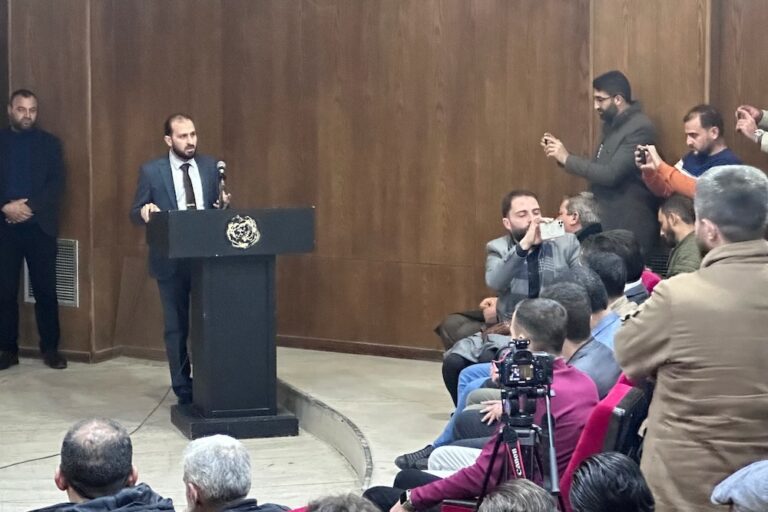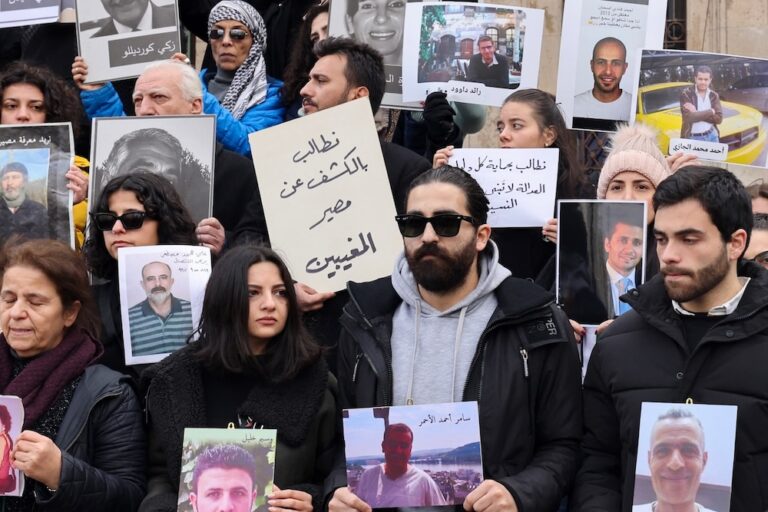(EOHR/IFEX) – The following is a 29 May 2005 EOHR statement: EOHR calls on Syrian authorities to end intimidation, kidnapping and arbitrary detention of human rights activists The Egyptian Organization for Human Rights (EOHR) strongly condemns the Syrian authorities’ intimidation of human rights activists in the form of arrests, arbitrary detention and kidnapping, and demands […]
(EOHR/IFEX) – The following is a 29 May 2005 EOHR statement:
EOHR calls on Syrian authorities to end intimidation, kidnapping and arbitrary detention of human rights activists
The Egyptian Organization for Human Rights (EOHR) strongly condemns the Syrian authorities’ intimidation of human rights activists in the form of arrests, arbitrary detention and kidnapping, and demands that these activists be released or given a fair trial before an ordinary court.
The policy of containment exercised by the Syrian authorities against human rights defenders has very recently been implemented with renewed momentum after a period of relative restraint on the part of the authorities. This has been expressed in a series of kidnappings and detentions:
– Syrian human rights activist and one of the founding members of the Arab Organization for Human Rights in Syria (AOHR-S) Nizar al Ristanawi was kidnapped on the 18th April 2004 in Hamma. After telephoning his wife from his mobile phone to say that he was on his way home he disappeared without a trace. Syrian security bodies eventually admitted that he is in their custody, fifteen days after he disappeared.
– Sheikh Mohamed Maashouq al Khaznawy, deputy director of the Islamic Studies Centre in Syria and a vocal supporter of the Kurdish cause, has allegedly also been kidnapped by the Syrian authorities. After receiving a call on his mobile phone, he left his office in Damascus and an hour later disappeared. The Syrian authorities have yet to acknowledge that they have him in their custody.
– Writer Ali al Abdallah, a member of the al Atassi Forum, was kidnapped from his home in the Damascene suburbs by ten armed men who told Al Abdallah’s son that they would bring his father back after a quarter of an hour. He was held in incommunicado detention before being transferred to the Supreme State Security Court on the 15th May 2005. His arrest occurred only a few days after the al Atassi Forum held a seminar on political reform in Syria and invited political parties of all denominations to put forward their vision of political reform in Syria. Al Abdallah was selected to read a working paper sent by the exiled leader of the Syrian Muslim Brotherhood Sadr Eddin al Bayyanoumi.
– Al Abdallah’s arrest was followed by that of eight members of the al Atassi Forum; Suhayr Jamal al Atassi, Hussein al Awadat, Nahed Badawiyah, Nazem al Nahr, Youssef al Jihmani, Mohamed Mahfoudh, Abdel Nasr Qalhouss and Jihad Massouti, who were detained without charge and without access to legal counsel. The group may face charges under Law 49 [1980], which criminalises membership of the banned Muslim Brotherhood, laying down penalties ranging from twelve years’ imprisonment to the death penalty.
– On the 22nd May 2005, Mohamed Raadoun, lawyer and head of the AOHR-S, was taken from his office in Lattakia by members of the political security police without any reasons being given for his arrest. He was transferred to security headquarters in Damascus and has so far neither been presented with charges nor been brought before a competent legal authority. Raadoun recently made public statements criticising human rights violations committed by the Syrian government.
– On the 29th May 2005, writer Habib Saleh was arrested by members of the military investigations forces. He had recently published a series of open letters on two internet sites to the forthcoming tenth Baath Party regional conference, harshly critical of the Syrian regime. It was predicted that he would be transferred to the security authorities’ investigations office yesterday evening or this morning.
– The legal process against lawyer Aktham Naissa, head of the Committees for the Defence of Democratic Liberties and Human Rights (CDF), is scheduled to resume on 26 June 2005. He faces charges of “opposing the objectives of the revolution” and “spreading false information.” While no clear penalty is laid down for the first of these charges under the Syrian Penal Code, the second carries a maximum of 15 years’ imprisonment. None of the charges laid against Naissa require acts of, or even the threat of violence, rendering them thought crimes used to crush Syrian activists peacefully exercising their right to freedom of opinion and expression.
Naissa’s case is being heard by the Syrian State Security Court (SSSC), the same body which will hear any charges brought against the above-mentioned human rights defenders. An exceptional tribunal established in 1968 pursuant to the state of emergency, it is composed of civilian and military personnel and lacks the fundamental procedural guarantees of due process; its verdicts cannot be appealed, it has rejected allegations of torture made by defendants and is controlled by the ruling Ba’ath Party. International observers sent to observe earlier hearings since the process began, including EOHR Secretary General Hafez Abu Seada, have unanimously condemned the SSSC as being unable to offer a fair trial. In 2001, the United Nations Human Rights Committee stated that SSSC procedures are “incompatible with the provisions of article 14 of the International Covenant on Civil and Political Rights.” According to the 2004 US State Department Report, “the majority of defendants who appeared before the SSSC in 2004 were prosecuted for exercising their political rights.”
EOHR calls on the Syrian authorities to respect its obligations to respect the freedom of expression and opinion under the International Covenant on Civil and Political Rights, end intimidation of human rights defenders and put an end to the state of emergency.


